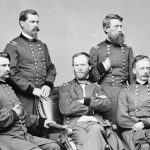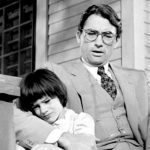 History
History  History
History  Health
Health 10 Everyday Activities That Secretly Alter Consciousness
 History
History Top 10 Historical Disasters Caused by Someone Calling in Sick
 Animals
Animals 10 New Shark Secrets That Recently Dropped
 Movies and TV
Movies and TV 10 Forgotten Realities of Early Live Television Broadcasts
 Technology
Technology 10 Stopgap Technologies That Became Industry Standards
 Weird Stuff
Weird Stuff 10 Wild Facts About Taxidermy That You Probably Didn’t Know
 Travel
Travel 10 Beautiful Travel Destinations (That Will Kill You)
 Miscellaneous
Miscellaneous 10 Modern Marriage Rituals Born from Corporate Branding
 Weird Stuff
Weird Stuff Ten Bizarre Visions of 2026 from Fiction
 History
History 10 “Modern” Problems with Surprising Historical Analogs
 Health
Health 10 Everyday Activities That Secretly Alter Consciousness
 History
History Top 10 Historical Disasters Caused by Someone Calling in Sick
Who's Behind Listverse?

Jamie Frater
Head Editor
Jamie founded Listverse due to an insatiable desire to share fascinating, obscure, and bizarre facts. He has been a guest speaker on numerous national radio and television stations and is a five time published author.
More About Us Animals
Animals 10 New Shark Secrets That Recently Dropped
 Movies and TV
Movies and TV 10 Forgotten Realities of Early Live Television Broadcasts
 Technology
Technology 10 Stopgap Technologies That Became Industry Standards
 Weird Stuff
Weird Stuff 10 Wild Facts About Taxidermy That You Probably Didn’t Know
 Travel
Travel 10 Beautiful Travel Destinations (That Will Kill You)
 Miscellaneous
Miscellaneous 10 Modern Marriage Rituals Born from Corporate Branding
 Weird Stuff
Weird Stuff Ten Bizarre Visions of 2026 from Fiction
10 Famous Writers Who Were Hypocritical
We all have writers we love for their incredible stories and genius ways with words. Some writers are gifted at telling important messages or political themes but may not always follow up on the morals themselves. Here are 10 famous writers who were hypocritical.
Related: Top 10 Dark Inspirations for Great American Writers
10 Christopher Hitchens Was Pro-Life
Christopher Hitchens was one of the most celebrated writers on religion and atheism during his time. As a father of New Atheism, he’s written such works as Hitch 22, Morality, Why Orwell Matters, and The Portable Atheist. Given that he was a fairly militant atheist and frequently criticized religion in a highly controversial way, you’d think that he’d be pro-choice, right? Turns out he wasn’t and was against abortion for a couple of reasons.
In 1988, Hitchens once did an interview with Crisis magazine on various topics such as abortion. One quote from him goes as follows, “I had a queasy feeling about the disposability of the fetus. This queasy feeling has not gone away. Once you allow that the occupant of the womb is even potentially a life, it cuts athwart any glib invocation of ‘the woman’s right to choose.’”
It seems like Hitchens had staunch reservations about whether women should have the right to abortion or not, which is in huge contradiction with the standard atheist position of pro-life being the exclusive domain of religious people. And given that Hitchens spent a lifetime attacking religion, this is undoubtedly pretty surprising to hear.[1]
9 J.R.R. Tolkien Supported a Ruthless Dictator
We all know and love J.R.R. Tolkien, the mastermind behind one of the most timeless fantasy stories of all time: The Lord of the Rings. These books have created entire subcultures and video game industries and changed roleplaying games forever. On top of that, the movies by Peter Jackson are some of the best made. LOTR is about overcoming prejudice and uniting as one people against great evil. It is then surprising that Tolkien threw a little bit of support behind Francisco Franco, a ruthless dictator whose regime created the Francoist era of Spain’s history.
In Letter 83, which can be found in the book The Letters of J.R.R. Tolkien, Tolkien addresses his son Christopher Tolkien and talks about poets, musicians, and Franco. Tolkien expressed admiration for the dictator, as he was fighting what Tolkien saw as Red propaganda against the Catholic Church. The Spanish Civil War was fought between left-wing Republicans and right-wing Nationalists, which Franco headed. The Republicans were an assortment of socialists, communists, anarchists, and other left-wing ideological groups.
While this support does not make Tolkien a fascist or anything, it is still odd that someone who was for peace and racial tolerance would suddenly support a man and movement against both. Tolkien, like many others, was a man of his time.[2]
8 George Orwell Criticized Government and Censorship But Sold Out Fellow Writers
George Orwell is one of the most celebrated political writers of all time. He was responsible for the profoundly influential books 1984 and Animal Farm. Orwell was big on attacking authoritarianism and provided us with much of the language for seeing those tools of oppression in real life. Unfortunately, Orwell didn’t always apply his teachings to practice.
Orwell wrote what would later be called “Orwell’s List” in 1949. This list would feature the names of people Orwell suspected were secret communists or Stalin sympathizers. A total of 38 people were written down on this list, some of whom were friends of Orwell. The Foreign, Commonwealth, and Development Office of the UK eventually made this list public in 1996, and a few Orwell fans were disappointed that their idol was seemingly hypocritical.[3]
7 Ayn Rand Accepted Social Security
Ayn Rand was one of the most infamous philosophers of all time. Her signature creation was Objectivism, which is the belief in ultimate individual freedom via laissez-faire free markets with no government oversight. She also wrote a few books, such as Atlas Shrugged and Fountainhead, which further outline her philosophy. And although Rand hated government programs like social security and welfare, she eventually ended up on it late in life.
The common interpretation is that since Rand had paid into the system her entire life, she felt entitled to the fruits of her labor. However, this ignores the fact that welfare is something all taxpayers put into. So she was still taking from the fruits of others, which is in direct contradiction with Objectivism. Rand was notorious for many reasons, but this blatant hypocrisy might be one of the most comical.[4]
6 Henry David Thoreau Preached the Simple While Living a Complicated One
Born on July 12, 1817, Henry David Thoreau wrote some of the most influential and insightful essays and poems on ecology, natural history, and political philosophy. Almost every American will have learned of him in either high school or university at some point in their lives. His most influential work is Walden, which preaches simple living and communing with nature over the complex, industrialized life many of Thoreau’s contemporaries were caught in.
However, Thoreau, the man himself, lived the exact opposite kind of life. For one, he often indulged in narcissism, and some considered his Walden experiment to be more about virtue signaling his romantic views on nature and the self rather than a working model he held to. Thoreau also depended on others, taking food and financial assistance from friends and family. He also continued partaking in civilized society, despite having extreme disdain for it, and took advantage of civilization’s many conveniences. At the end of the day, he was firmly a man of his time and societal stature.[5]
5 John Locke Advocated for Individual Freedom but Supported Slavery
John Locke was one of the most influential philosophers of all time and pretty much the founding father of Liberalism. As an Enlightenment-era thinker, Locke investigated the big questions and social issues of the day, such as education, epistemology, and government. His most famous works include Two Treatises of Government (1690), a book on natural rights and government by consent that rejects the divine right of kings, and Some Thoughts Concerning Education (1693), which contains Locke’s ideas on reform of the education system. But despite being a hugely influential figure for liberal-minded and anti-slavery groups, Locke himself supported the institution of slavery.
Locke had shares and investments in various pro-slavery groups such as the Lords Proprietors of the Carolinas and Royal African Company. Locke also argued that making prisoners of war slaves was a morally righteous thing to do. This, unfortunately, also applied quite directly to the Atlantic Slave Trade. Like Thoreau, Locke was also a man of his time, as support for slavery was hardly out of the norm back then. Still, Locke is different in that he is often held up as a champion of human rights.[6]
4 Jean-Jacques Rosseau Championed Good Parenting but Abandoned His Kids
Genevan philosopher Jean-Jacques Rosseau was an Enlightenment-era heavyweight philosopher and one of the most influential to come from the movement. Everyone will probably know him best from his political treatise The Social Contract, which argues for a universal social contract in that all members of a society agree to harm reduction and co-existence. His other work, Emile, or On Education (1762), is an exhaustive analysis of the education system, its flaws, and how to improve it to make the lives of children better. Despite caring a lot about the well-being of children, Rousseau himself wasn’t too kind to his kids.
Rousseau had five children with Therese Levasseur, whom he met in 1745. However, neither Rousseau nor Levasseur raised any of them, as they sent each child away to an orphanage shortly after birth. The children were neglected and did not live good lives afterward. This parental cruelty so fiercely highlighted Rosseau’s contradictions between his personal and philosophical lives that his rival Voltaire criticized him for it in a letter addressed to him in 1755.[7]
3 Beloved Children’s Author Enid Blyton Was an Abusive Mother
Having sold as many book copies as J.K Rowling, Enid Blyton was one of the most famous and successful children’s authors of all time. She wrote classic book series like The Famous Five, Noddy, The Adventure Series, and The Secret Seven, all centering around children going on adventures or solving cases. Though Blyton’s books are famous, they are not without their criticism. A few people have pointed out that some of Blyton’s stories carry outdated racial and gender aspects, as many stories of that time did. With that being said, Blyton herself was a fairly awful mother, ironically enough.
Blyton had two daughters, Gillian and Imogen, with her husband, Major Hugh Alexander Pollock. Long after childhood, Imogen wrote an autobiography called A Childhood at Green Hedges, which had a long account of all the abusive and neglectful things their mother did to them. Enid was often too wrapped up in her writing to take care of either of them, leaving them mostly to nannies. Their mother was also frequently cruel and would berate them for seemingly innocuous things. Guess the old idiom is true: never meet your idols.[8]
2 Virginia Woolf Was a Feminist and Antisemitic
By now, Virginia Woolf needs no introduction, but we’ll give one anyway. Woolf is one of the few authors whose own tragic suicide is perhaps as well-known as her writing. She wrote such classics as Mrs. Dalloway, To the Lighthouse, The Waves, Orlando, and A Room of One’s Own. Woolf’s works explored female independence and feminism, along with depression and mental health issues, something she struggled with for the entirety of her life. Her lucid, dreamy stream-of-consciousness style left a staggering influence on the literary world alongside T.S Eliot and James Joyce, and she is widely celebrated in feminism studies as well.
Unfortunately, this did not save her from having casual prejudices against Jewish people. She would often make casual antisemitic remarks to her Jewish husband, Leonard Woolf, such as commenting on his “Jewish laugh.” She once wrote in a letter to Ethel Smyth that a Jewish friend of theirs “seemed to me like a kind of insect—an ugly, dirty Jew.” Yikes. You’d think her having a Jewish husband would have stemmed some of this antisemitism, but apparently not.[9]
1 Flannery O’Connor Was an Anti-Racist Who Said Racist Things
Flannery O’Connor was a monumental figure of Southern Gothic literature, which focuses on grotesque and violent themes and usually takes place within the South. Her works, such as A Good Man Is Hard to Find, The Violent Bear It Away, and Wise Blood. Her stories also sometimes dealt with racism in the South, especially toward Black people. Flannery was critical of the way white Southerners treated non-white people. Unfortunately, O’Connor was also a product of her time and said some fairly racist things.
O’Connor would often use the n-word in racist jokes to friends in correspondence. While she supported integration on paper, she once called herself “a segregationist by taste.” O’Connor also said that Black people were better off under Jim Crow. Ultimately, she was a complicated person with extreme views on non-white people. Like many authors of that era, she believed in things that would become outdated in the following years after the passing of the Civil Rights Act of 1964.[10]








